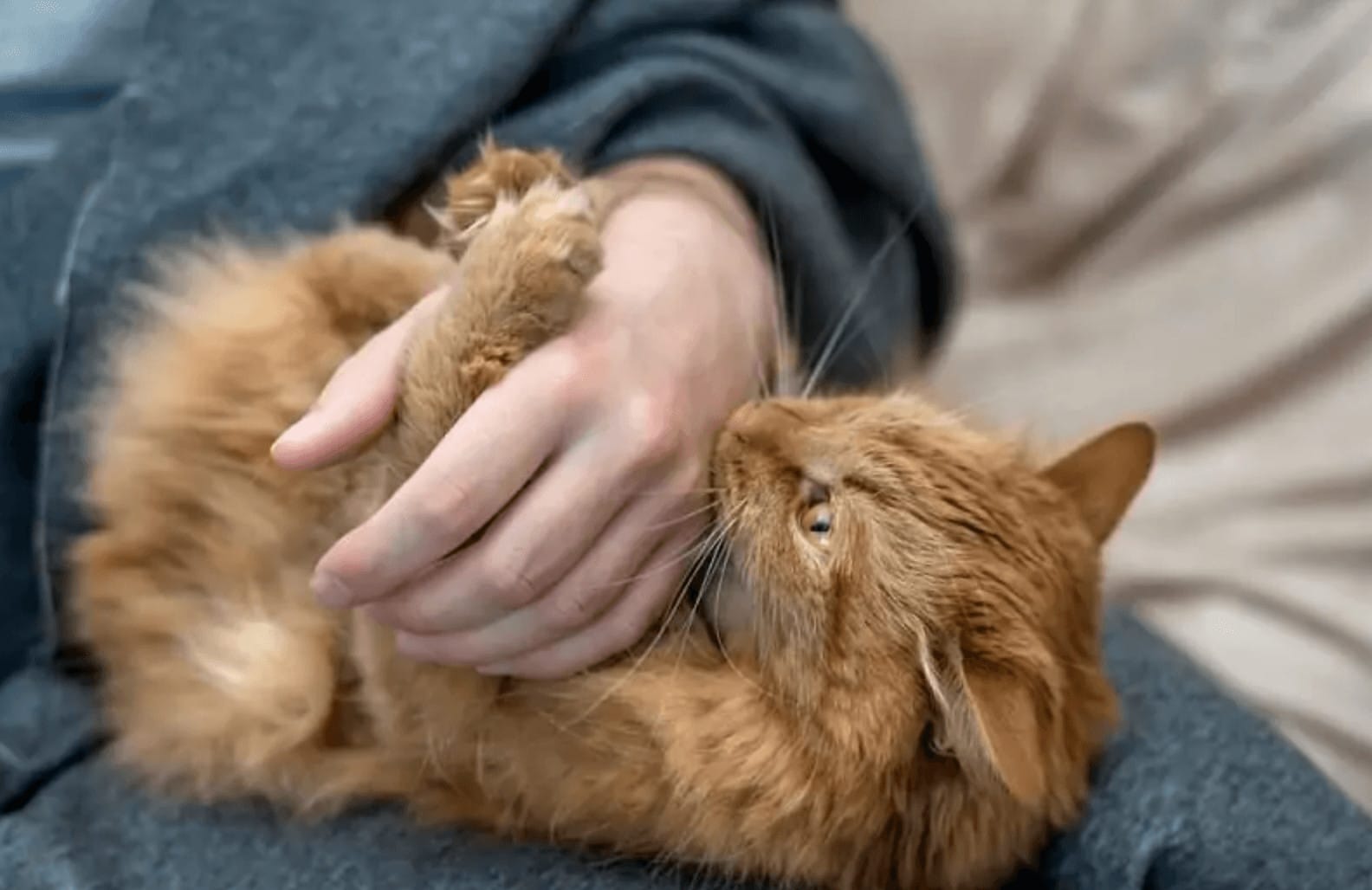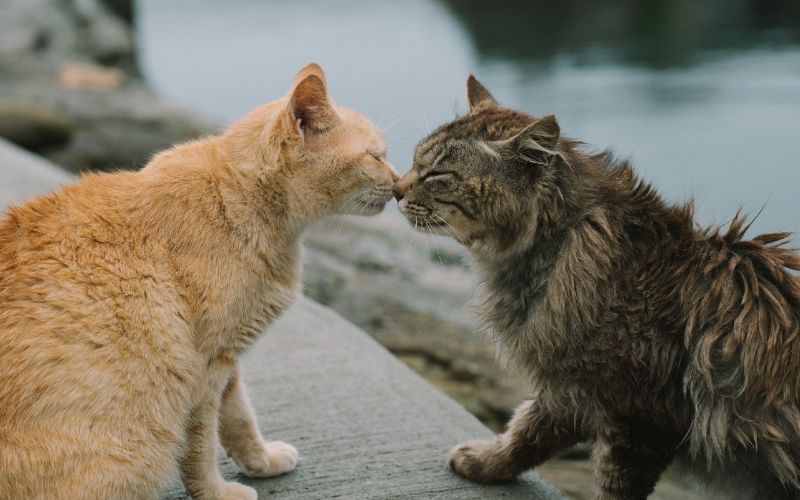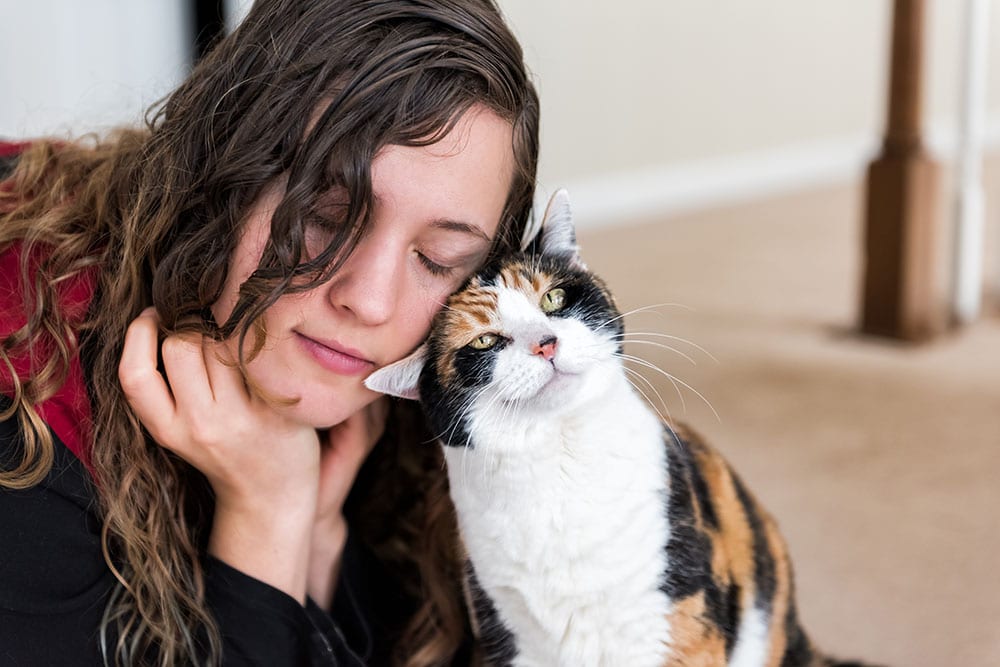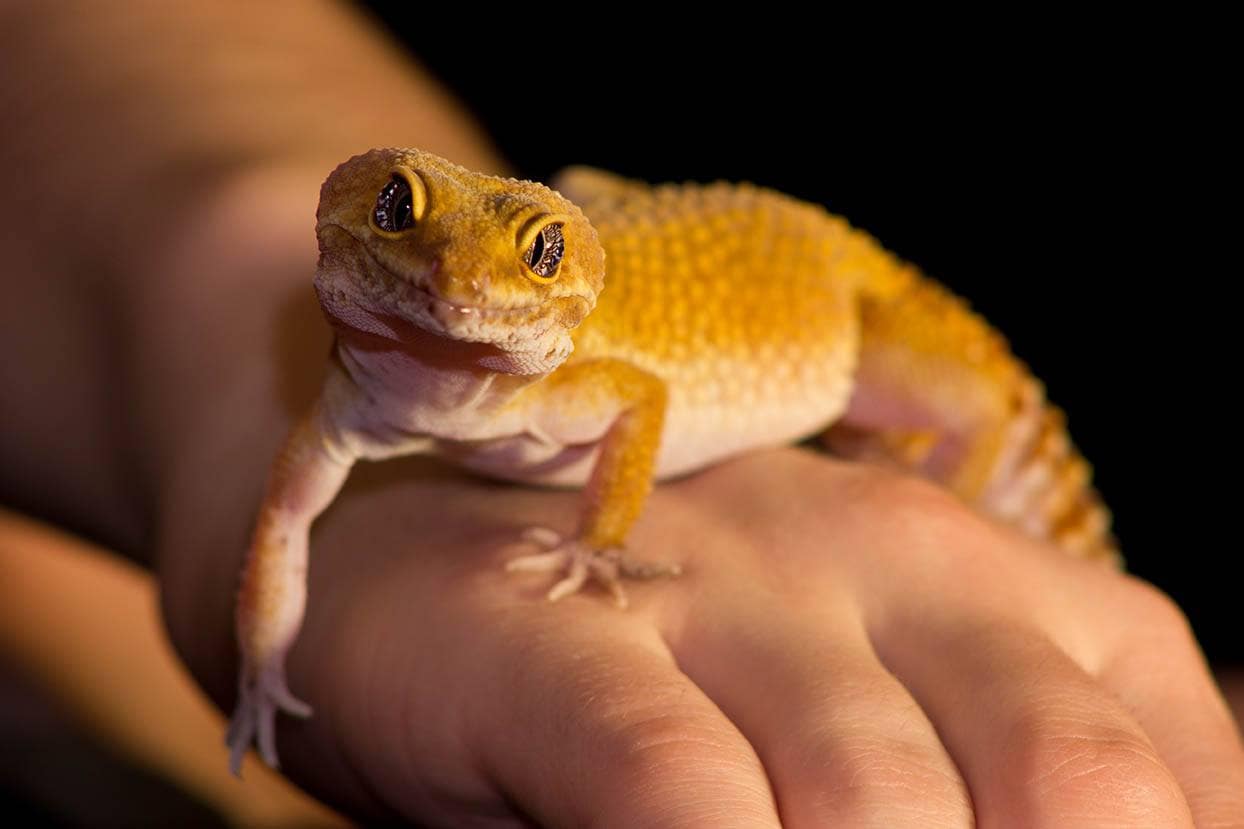VET APPROVED

The information is current and up-to-date in accordance with the latest veterinarian research.
Learn more »Click to Skip Ahead
As a cat owner, you likely have been in a situation where you were gently petting your cat when they suddenly nipped your hand. Maybe they even started to “chew” on your hand. Yet otherwise, your feline seems to be enjoying your attention.
Some people attribute this behavior to cats’ perceived fickleness. These critters want us to pet them one second but not the next! However, other people call this behavior a “love bite.” Basically, they think that this is a sign of affection.
Like many things, cat love bites are not simple to understand. People generally have a hard time interpreting any of their cat’s behaviors, which can make deciphering feline nips especially difficult. In this article, we look at all the potential meanings of “love bites,” including things that don’t make them love bites at all.

The 5 Reasons Why Cats Give Love Bites
1. They’re Grooming You or Seeking Attention
When showing affection to each other, cats often participate in grooming. Usually, cats lick with their tongues. However, they also need to occasionally use their teeth, like to pull things out of their fur or untangle mats.
When you pet your feline, your cat may begin grooming you. Typically, this may start as licking. However, your feline may also end up gently biting your hand as they “clean” you. These bites usually don’t break the skin, and your cat is generally quite relaxed while doing so. Your cat may tense right before the bite but will relax right afterward.
If your cat is licking you and then ends up giving you a gentle nip, this likely is what’s going on. Love bites, in this instance, may also be a sign of your cat showing you affection or seeking your attention.
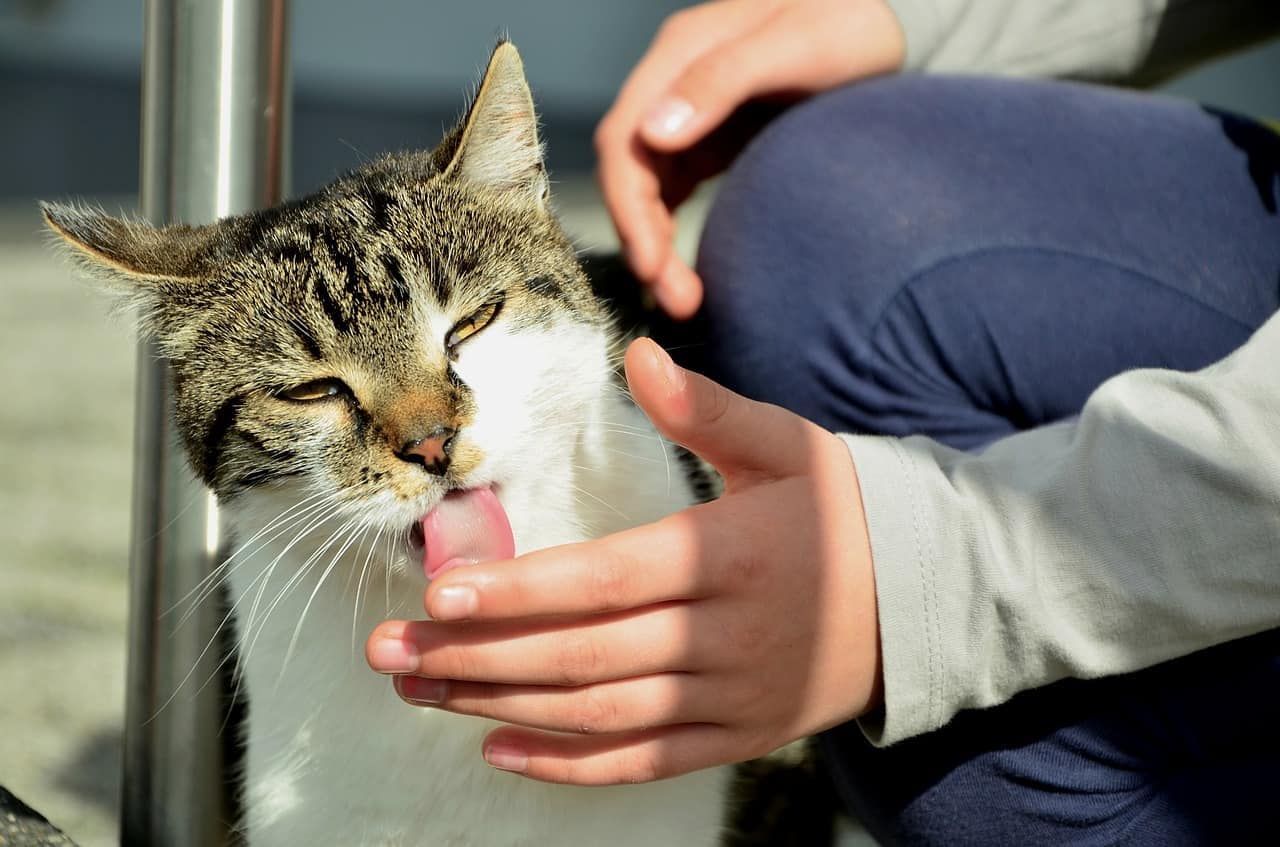
2. Your Cat Doesn’t Enjoy the Petting
Many cats may enjoy lying near you or in your lap. However, they may not enjoy petting as much or find after a while that they’ve had too much. They may bite you gently as a nice way of telling you to stop. They may or may not exhibit other behaviors, like jumping away and simply leaving your side.1 Not all of these cats will leave your lap after the episode. Some may continue to lie in your lap because they enjoy it. They may just want you to stop petting them.
Even cats that enjoy being pet sometimes may not enjoy being pet at other times. For example, many cats don’t enjoy being pet when trying to sleep, as it disturbs them. Your cat may want to sleep in your lap but may not want you to pet them while they do so.
Typically, this behavior is evident because your cat may initially look impatient, start swishing their tail or tense up while they bite. If you continue petting them, they may bite you again or leave. Their tail may also start wagging back and forth quickly, which signifies that they are annoyed. With this type of gentle warning bites, it’s unlikely that your cat will hiss or growl.
3. You’ve Touched a Spot That Is Uncomfortable or Painful
In many cases, your cat may not like being touched in certain places. Often, cats find petting on their belly and near their tail to be uncomfortable. If you touch these places, they may respond by hissing or sometimes even biting you. This is a polite way for them to tell you “please stop.” Often, you may notice other signs that the spot is uncomfortable for your cat. For instance, your cat’s tail may twitch when you pet it, or they may purposefully position their tail away from you. Some cats will pre-warn you with a growl. However, this isn’t always the case, especially if the cat is less vocal.
While some cats don’t like being petted in certain places, others may develop injuries that may make certain areas sore. These can be of various degrees of severity and pain. Your cat may have a soft tissue injury or a bruise and be sore in a particular spot for a few days, or have a wound or an abscess that requires veterinary attention.
Alternatively, the sore spot can indicate something a bit more serious. For instance, a bone fracture may cause a cat’s leg to be sore and swollen, with them not wanting to walk on it. Old injuries can also remain sore. If your cat injured their tail at some point, it might remain sore even after it is healed.
If your cat shows any other odd behaviors or suddenly has a sore spot, you should contact a vet. Many cats may bite or scratch when they become injured if the affected area is examined, but others, not so much, depending on the extent of their injuries. Cats are excellent about hiding their injuries, so small signs are usually the only things you notice when your cat is injured.
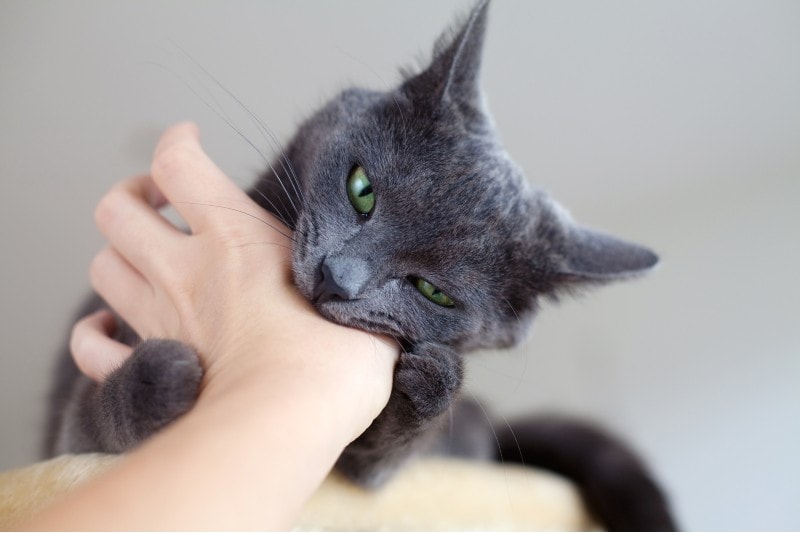
4. They Are Overstimulated
Cats can become overstimulated with continuous and persistent petting. If you’ve been petting your cat for a while, the petting may stop feeling good, or they may feel overwhelmed by the constant sensation. This can initially cause excitement or arousal, but then progress to discomfort, pain and even static electricity which cats find unpleasant. This can in turn make some cats bite, due to simply being overstimulated and wanting you to stop.
A cat’s hair follicles can become overstimulated with too much rubbing. This can cause static and discomfort. People are similar. The first time that someone rubs your arm, it isn’t going to hurt. However, if they keep rubbing your arm, it will start to get more uncomfortable. Cats are the same way. You may have been petting your cat for too long.
5. They Are Playing
Finally, cats may just be trying to play with you and biting is just another way for them to express their natural predatory behavior. However, it’s important to redirect this behavior from your fingers to toys and other appropriate objects, in order to prevent it from becoming a habit. Avoid rewarding your cat with attention when they bite you during playtime, and instead reward them when they’re playing with their toys. Avoid involving your fingers during play and zoomies, or else your cat may develop a particular fondness for them, thinking it’s normal for them to bite you.

How to Respond to Cat Love Bites
If your cat gently bites you, there are a few appropriate ways that you can respond. Firstly, observe the situation closely and the circumstances leading to the bite, as well as your cat’s body language, in order to understand the reasons behind it, so you can prevent it next time.
1. Stop Petting Your Feline
In almost all cases, your cat biting you is a sign that they don’t want to be petted anymore. Therefore, your first response to love bites should be to stop petting your cat. This response also teaches your cat that love bites aren’t appropriate. You don’t want your feline to think that biting gets them more attention.
Don’t jerk your hand away, however. Cats are visual predators, and this may encourage them to bite your hand more. Instead, remove your hand slowly, as soon as you notice the initial signs your cat is becoming annoyed or frustrated. Don’t wait for them to become overstimulated.
If your cat asks you to pet them again after you withdraw your attention, you may continue petting them after they’ve had a bit of a break. Typically, if a cat doesn’t want to be petted, they won’t ask to be pet after you stop.
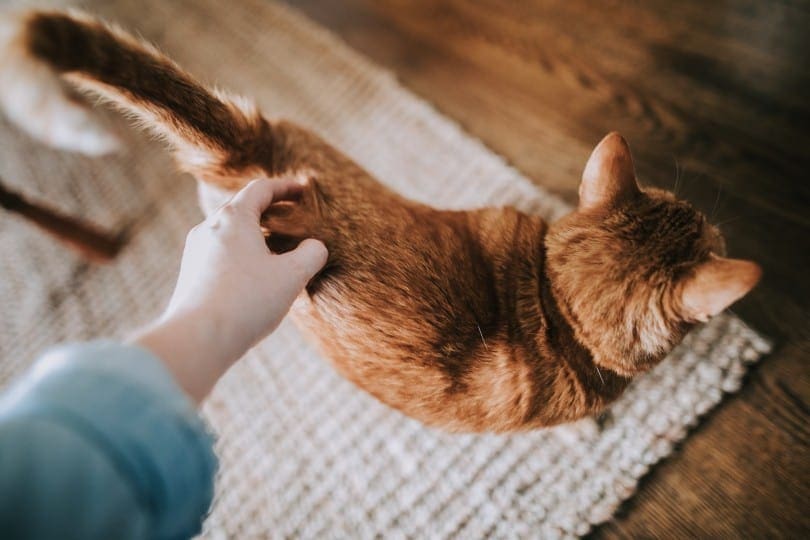
2. Redirect Them to a Toy
Some cats love their toys and as soon as you think they may be getting ready to bite you, generally as part of playtime, redirect them to a toy. If you have a toy nearby, grab it and play with your feline. A feather wand is a good option for a cat that likes to bite and nibble, or in kittens that are teething, as it puts lots of distance between the toy and your hand.
Not all cats will jump into a play session, though. So, don’t push it if your cat seems uninterested and give them space to leave.
3. Visit the Vet
If your cat suddenly seems to dislike being petted in certain places, you may want to consider taking them to the vet. This could be a sign that your feline is injured. Cats are notorious for not showing any signs when they are hurt. Even extremely injured cats may just lie around and seem like their usual lazy self, as they could be too painful to move. This is especially true for physical injuries.
This behavior is mostly a survival mechanism. The cat doesn’t want to attract attention from other cats or predators, so they continue to act normal. In reality, they need vet care. Typically, it is better to be safe than sorry when it comes to taking them to the vet.
Physical injuries may also lead to unwanted bites if you’re accidentally petting your cat in the area that hurts or if you’re trying to pick them up in order to find out what happened. However, other underlying health issues other than external injuries may cause the cat to feel lethargic and even impatient when being handled, due to the pain they may be experiencing, so some may be more hissy, while others can bite.

4. Give Your Cat Some Space
If your cat is overstimulated, it is best to give them some space. Sometimes, our cats can get overwhelmed by our constant petting and desire to interact. Just like people, cats need time alone. Constant petting and attention can overstimulate them. In these cases, it is best to give your feline much-needed space.
Don’t take this as a sign that your pet doesn’t like you. Instead, your cat may be a bit more introverted than other felines.
5. Pay Attention to Their Body Language
Some cats will bite at specific times. For example, some cats may not like to be petted in certain places or during certain times. Some cats may like being petted when in their favorite relaxing spot. However, others may not.
You should pay attention to your cat’s particular behavior. If you can figure out exactly when and where your feline doesn’t like to be petted, you can adjust your behavior accordingly. Love bites are often communication attempts and cat owners should listen to them.
Some cats will bite at specific times. For example, one particular cat may always bite after seven strokes, as they become overstimulated after that. Individual cats may not like to be petted in certain places or during certain times. Some cats may like being petted when in their favorite relaxing spot. However, others may not.
You should pay attention to your cat’s particular behavior. If you can figure out exactly when and where your feline doesn’t like to be petted, you can adjust your behavior accordingly. Love bites are often communication attempts and cat owners should listen to them.

Conclusion
Despite their name, a love bite can be a sign of many things, such as play, natural predatory behavior and affection, but also frustration, overstimulation or even pain. It can be a sign that your cat is overstimulated or otherwise uncomfortable with being pet excessively at that moment, and they are gently asking you to stop. If you obey this request right away, your cat will learn that they can trust you, and they’ll not only be fine with future petting sessions, but they may also let these last longer. It comes down to reading your cat’s body language and listening to their cues.
See also:
Featured Image Credit: Irzhanova Asel, Shutterstock
